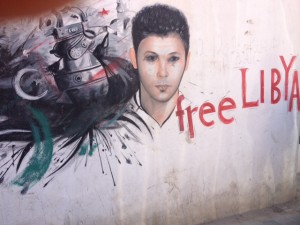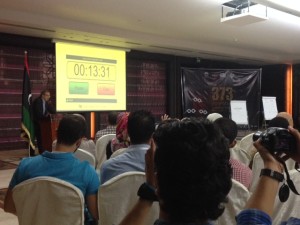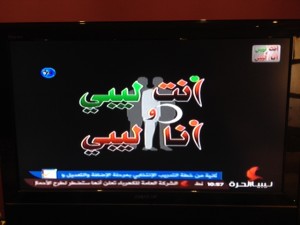Former Libyan revolutionaries long back to the ‘golden days’ of 2011 when the majority of the Libyans were unified for a common cause. Though civil society organizations are mushrooming, their impact seems limited. Citizens say they suffer from depression and blame the government for doing nothing. “We Libyans need to appreciate each other again.”
Thursday evening before the weekend. Drop into a random discussion of men, the topic is likely to evolve around heroic deeds during the revolution. “We cared for each other”, says a 43-year old former revolutionairy with a satisfied grin of memory on his face. “I long back to that collective spirit.”
 Freedom of speech
Freedom of speech
Many believe Libya will only be truly free if there are no armed militias, no Islamists, a strong army and police force, and all citizens including minorities feel respected. Asked for positive developments, a friend says: “The revolution brought us freedom of speech. But what is the use of it without work or money in our pocket?” An unemployed 48-year old says: “The best thing of the revolution is it brought my brother back home in freedom, who live 13 years in exile.”
Spoiled
“Libyans should take the example of the Egyptians. They cross the desert on their flip-flops and make money here. We are spoiled”, says a life-time football keeper who witnessed Libya during five historical episodes: the Italian occupation, the Four Power-turning-United Nations mandate, King Idris, Qaddafi and post-revolution. “We are a rich country thanks to oil and gas. We drive big cars, we take our salaries from the government, but we don’t work in return. We complain, tell what is wrong with the government, with our neighbors and our environment, but we never reflect at ourselves.”
Safety and respect
A high educated professional working in the international field describes his worries about Libyan society: “Often people say 42 years of Qaddafi made us will-less and destroyed our sense of citizenship. That might be true, but look at it the other way. Why weren’t we able to hold on to the good things from Qaddafi’s regime, like safety and respect for each other? We need to start and look at ourselves, and learn to appreciate each other again; not just our own families, but fellow citizens, neighbors, inhabitants from other towns.”
High expectations
The post-Qaddafi era didn’t meet the high expectations after the revolution yet. An 18-year old graduate says: “I am definitely depressed, like all my friends. How can I not be, if none of the expectations of the revolution has been met?” Also international aid programs suffer from not meeting expectations. Obstacles identified are a lack of implementation, almost no local initiatives nor constructive follow-up programs.
 Turning Points
Turning Points
Still, some are eager to make a difference in their society. Like the engineering students of LES Team that organized a Turning Point event where prominent Libyans speeched about the turning points in their lives. With limited funding from private companies, mainly interested in branding their products, a team of voluntaries was able to offer some inspiration in its society. “I came for tips on professional development, we don’t get them in university”, comments a student in architecture.
Active citizenship
Professional and personal development is a field that arouses the interest of many Libyans, many agree it is much needed in the country. A university professor in philosophy says: “We need self-confidence, collective education and positive thinking to counter the current negative wave. People need to learn to re-use the intrinsic motivation at the time of revolution again, and use it for constructive, active citizenship.”
 Human potential
Human potential
A young professional says: “We know what we want, the problem is we don’t do what we should do. We should focus on the human potential, focus on the similarities between Libyans. That will make us stronger. TV promo’s about our National Dialogue saying ‘We are all Libyans’ are not enough. We need to feel and live it.”
Co-creation
Libya could benefit from a more interactive dialogue process with its citizens, with an appreciative methodology like Appreciative Inquiry. Focus on what goes well brings out strength, and enables co-creating a common future together. That brings John F. Kennedy’s quote to mind: ’Ask not what your country can do for you, ask what you can do for your country.’ A power that is still dormant due to decades of dictatorship and its inherent negligence of the concept of citizenship.


